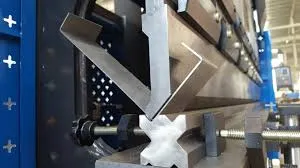Selecting a press brake for your sheet metal fabrication business is a crucial decision. Hydraulic and mechanical press brakes are the two most popular types according to production requirements such as volume, accuracy, and flexibility.
If you have no idea what it means to operate these types of machines in a shop floor, click here to learn what press brake operators do and what skills they need to have.
In this article we will discuss the differences between hydraulic and mechanical press brakes and which one makes the most sense based on your workflow .
How Each Press Brake Works:
Hydraulic Press Brake:
The ram is raised and lowered with fluid pressure in hydraulic systems. This results in a smooth, controlled motion that is ideal for very fine and complicated bends. Many modern hydraulic machines are CNC controlled, giving the operator the ability to digitally program the bend sequences with high repeatability.
Mechanical Press Brake:
In a mechanical press brake, the power to operate comes from a motor which turns a flywheel. When engaged the ram is cycled through a full stroke. This is a less complex system which is very fast but not easy to manipulate once it is in operation.
Accuracy and Consistency:
Hydraulic press brakes can create very precise bends. During a cycle operators have the ability to stop, slow, or reverse the ram giving them increased control over the final shape. This is why hydraulic machines work better for custom pieces or complex bends .
Mechanical presses also run at a constant speed and complete the stroke whether or not adjustments are made. These are good when looking to manufacture high quantities of perfect clones, but they are not flexible enough to deal with the more finer or diverse work .
Speed and Productivity:
Mechanical press brakes tend to shine when it comes to speed. These machines are ideal for high volume production runs because the flywheel provides storage of energy and rapid delivery of it. If you’re producing hundreds or thousands of copies of the same part then a mechanical press is sufficient.
Hydraulic machines tend to be slower – but more versatile. This extra control does make them a bit slower to cycle, but that time is time saved in materials when making fine detail or intricate parts. detailed or delicate components.
Safety Considerations:
Where hydraulic press brakes clearly have the advantage is in safety. Because the operator can actuate the ram anywhere along its potential travel path to stop it, the danger of accidents is greatly minimized. Safety features like laser light guards, safety relays and overload protection are common with most hydraulic models as well.
On the other hand, given that, when a mechanical press is activated, it stroks through to finish. There is no aborting the process if something goes wrong halfway through and this makes these machines more dangerous and necessitates more stringent safety precautions.
Maintenance and Operational Costs:
Hydraulic machines need a regular check up, in particular on the level of hydraulic oil, hoses, and seals . But, today’s models use energy saving servo or inverter technology, which conserves energy when idle.
Mechanical press brakes are less complex and easier to service. They do not offer energy saving features available in newer hydraulic models, and, being mechanical, parts such as clutches and flywheels are prone to wear and tear over time.
Which One Is Right for You?
The answer depends on your production goals:
Choose a hydraulic press brake if you:
- Need precision and flexibility
- Handle a variety of part shapes and sizes
- Want integrated CNC control for customization
Go with a mechanical press brake if you:
- Run high-volume production with simple bends
- Want faster cycle times for repeated jobs
- Prefer a lower upfront machine cost
To explore advanced sheet metal machinery that suits a wide range of industrial needs, visit miharmle-cnc.com, a trusted supplier of high-performance press brakes, shears, and laser cutters trusted by manufacturers in over 50 countries.
FAQs:
Can I upgrade a mechanical press brake to include CNC controls?
As traditional mechanical press brakes are not CNC-compatible, some retrofitting can be done, mostly using semi-automatic control systems . But it still doesn’t compare with the precision and flexibility of a CNC hydraulic press brake designed specifically for the purpose. If you are looking for advanced programmability, a CNC hydraulic model is a more intelligent long term investment.
What type of press brake is better for bending high-strength steel?
Hydraulic press brakes tend to be a better fit for bending high strength or thicker steel materials. Unlike the static-formed wood, because they have pressure throughout the bend and not just in one spot, there is a lower chance of cracking as the pressure is more even. Mechanical presses find it difficult to do this type of materials because they cannot cycle very well and control the application of force like these types of presses do.
Final Thoughts:
Hydraulic and mechanical press brakes both have a place in today’s manufacturing. While hydraulic presses ideal for applications where precise work and safety is fundamental, mechanical presses are ideal for high speed work that must be repeated with consistency .
Think about the production mix you want to do, safety standards & needs that may include how you want to operate the space for the long term before investing. When the proper one is selected, it can create more efficient designs with less material waste and better overall part quality.
Related Post:
- Reid Russom – Purpose-Driven Educator and Leader!
- Numa Zara – Digital Fashion Revolution Blending Identity!
- Ecryptobit – Buy, Sell & Secure Digital Assets!
- Long Shooter – From Idioms and Film!
- Kick Flipper – Best Indoor Practice Board!
